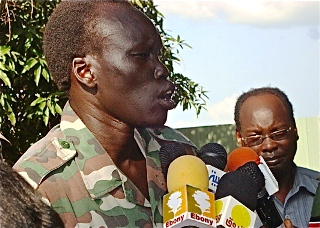SPLA denies Jonglei rebels’ claim on capture of Boma
May 7, 2013 (BOR) – Rebels in South Sudan’s Jonglei state claimed on Monday that they had captured the strategic town of Boma in Pibor County from South Sudan’s military – the Sudan People Liberation Army (SPLA).

“The gallant forces of the South Sudan Democratic Army (SSDA) yesterday stormed and captured the strategic town of Boma. SPLA forces ran away leaving behind more than 50 dead bodies” the press release said.
“More than 250 soldiers of the Wildlife and the Police gave themselves up and are now safe in the hands of our heroic Cobra units. Since Boma is now under our control, they have no moral authority to claim being the legitimate government of South Sudan” the statement, attributed to Colonel Peter Konyi Kubrin, said.
“This is a practical reminder to those who did not take our warning of imminent attack on Pibor and Kapoeta seriously. We are determined to rid the eastern bank of Bahr el Jebel of the corrupt and rotten regime in Juba before the end of the year”, the rebels said on Monday.
The spokesman of the SPLA, Philip Aguer, has denied that the rebels have captured any part of the town.
A series of interviews on Tuesday with people in Jonglei’s state capital Bor, who had established satellite phone contacts with their relatives in Boma, confirmed that Boma has fallen to SSDA.
Boma payam [district] is split between upper Boma (known as Boma Up) on the top of the area’s hills and lower Boma (known as Boma Down) at the foot of the hills. The two areas are within an hour walking distance from each other,
A local government officer in Bor, who comes from Boma, said that he had been in contact with people who had fled the area.
“The rebels are now in Boma Down, while the SPLA ran to Boma Up. They took the town on Sunday. They also tried to attack Boma Up this morning but failed”, one of the official’s relatives had told him.
Jonglei’s governor, Kuol Manyang Juuk, said that he has heard “rumors” from people in the area but “nothing official”.
Juuk said he has been trying to reach the commander of the SPLA’s “Eagle” division in the area, General Peter Gadet, but failed to get through to him.
“Even if the rumor was true,” he said, “there was no need to worry as the army would soon take the upper hand in retaking the Boma Down”, describing Yauyau’s rebels as “civilians” who “don’t have ammunition”.
Boma was one of the first areas that the SPLA captured from Khartoum’s Sudan Armed Forces in 1985, two years into the two-decade civil war that led to South Sudan’s independence in 2011. It is a key area due to its proximity to the Ethiopian and Kenyan borders.
The area is also known for Nyat National Park, which hosts a variety of wild animals including elephants. Sudan Tribune has not been able to independently verify the rebel’s claims due to Boma’s remoteness and the poor telephone network outside Bor town.
HUMANITARIAN CONCERN
Toby Lanzer, the United Nations humanitarian coordinator in South Sudan, on Monday decried the deteriorating security situation in the area, saying the conflict had affected the activities of the relief workers.
In a statement Lanzer said:
“I am deeply concerned about the humanitarian situation in Jonglei State, where thousands of civilians are in need of assistance and protection, and where humanitarian workers have treated more than 450 casualties, including children, since February. We have seen houses burned down and civilian properties destroyed. Facilities such as schools and health centres have been robbed, looted and occupied by armed actors. In the past week, hostilities in Maruwa hills, Pibor County, forced scores of civilians to flee their homes and aid agencies to relocate their staff.”
The top humanitarian official urged all the parties involved in the conflict to abide by their obligations under national and international law to ensure that civilians caught in the conflict should not be harmed and be accorded due respect and medical care.
The SSDA say they are neither in conflict with the United Nations Mission in South Sudan (UNMISS) nor are they working in any way to hinder activities of the relief organizations in the area.
JONGLEI DISPLACEMENT
Despite South Sudan’s independence from Sudan in 2011 and a peace deal with Khartoum in 2005, Jonglei has been blighted by insecurity in recent years, not only from Yauyau’s rebellion, which he first launched in 2010, but also from cattle raiding related violence.
In early 2012, over 100,000 people were displaced by cattle raiding and revenge attacks. A state-wide disarmament campaign and peace process was launched by President Salva Kiir but brought only short term improvements.
“Humanitarian agencies have re-positioned aid across the state and are ready to help people affected by the hostilities, reaching more than 23,000 people in Akobo County,” Lanzer said.
“In Pibor and Pochalla counties, where needs are likely increase, constraints on the humanitarian response are growing. Our capacity to provide emergency surgery as well as regular medical care has diminished because of insecurity. Shots have been fired at convoys carrying life saving supplies, and I am deeply concerned about the safety and security of aid workers”, Lanzer said.
The top humanitarian worker said aid workers have a unique and protected role in assisting the most vulnerable, calling on all parties in Jonglei to ensure that agencies carry out their work unhindered and in safety.
(ST)
